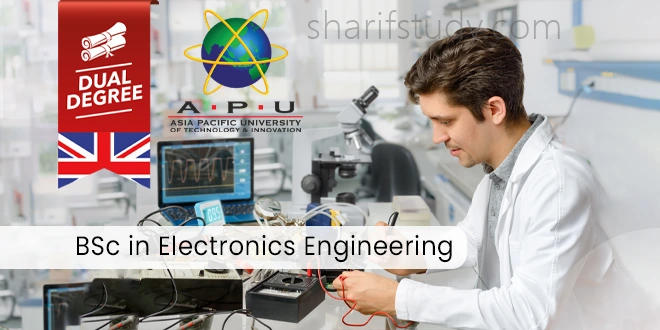APU BSc in Electrical and Electronics Engineering is a field that examines electricity and electrical technologies. Students will learn about Electrical theory and analysis, amplifiers and electronic devices. They can design, develop, test, and repair electrical systems and other electronic devices after graduation. Electrical engineering plays an important role in industries such as healthcare, transportation, and robots. After achieving a degree in Electrical and Electronics Engineering, you will have an extensive knowledge of the importance of electric power and power generation. In addition, you will acquire technical and analytic skills and abilities to solve problems.
Program Outline
APU BSc in Electrical and Electronics Engineering is specifically designed to teach students :
- High-quality undergraduate engineering education by providing students with a curriculum that is firmly grounded in electrical & electronic engineering fundamentals.
- A study in both the areas of electronics fundamentals as well as electrical power systems including the areas of generation, transmission and distribution of electrical energy.
Degree Level 1
In year 1, Students will learn fundamental engineering concepts in the areas of Electrical Analysis, Engineering Materials, and Engineering Design. Other programs aim to give the basic academic abilities required to satisfy the demands of employers, as well as a strong background in IT and entrepreneurship ideas.
Common Courses
- Analysis of Circuits
- Instrumentation & Measurement
- Fundamentals of Entrepreneurship
- Engineering Mathematics 1
- Engineering Mathematics 2
- Introduction to C Programming
- Programming with Python
- Engineering Materials
- Engineering Design
Degree Level 2
In year 2, Students begin to focus on courses that grow the necessary fundamental knowledge and skills in Electrical & Electronic Engineering, such as Analogue Electronics, Digital Electronics, Electromagnetic Field Theory, Engineering Software & Applications, and Signals and Linear Systems, at this stage.
Common Courses
- Analogue Electronics
- Digital Electronics
- Engineering Mathematics 3
- Electromagnetic Field Theory
- Engineering Software & Applications
- Signals and Linear Systems
- Innovation Process
Specialized Courses
- Electrical Machines 1
- Electrical Machines 2
- Electrical Power Utilization
Internship
To bridge the gap between academic and professional worlds, students will experience an Internship or Industrial Training for at least 16 weeks. This ensures they transition smoothly from academic settings to real world job.
Degree Level 3
In year 3, The main part of this level is focusing on specialized knowledge and skills in the areas of Control Engineering, Machine Vision & Intelligence, Communication Engineering Principles, Microprocessor Systems & Embedded Software, Digital Signal Processing, Generation, Transmission, and Distribution of Electrical Power, and Power Electronics & Drives.
Common Courses
- Control Engineering
- Communication Engineering Principles
- Engineering Mathematics 4
- Microprocessor Systems & Embedded Software
- Digital Signal Processing
- Engineering Project Management
- Venture Building
Specialized Courses
- Generation, Transmission & Distribution of Electrical Power
- Power Electronics & Drives
Elective Courses (Choose 1)
- Machine Vision Intelligence
- Analogue Integrated Circuits & Systems
Degree Level 4
In year 4, Engineering programs provide the necessary industry application and technological abilities for employment after graduation. students will learn about Personal and professional development, technical capability, and understanding of how to create, begin, and manage the generation of new ideas .
Common Courses
- Project Phase 1 (Investigation)
- Project Phase 2 (Implementation)
- Group Design Project
- Engineer in Society
Specialized Courses
- Switchgears and Protection
- Power System Analysis
- High Voltage Engineering
Elective Courses (Choose 1)
- Renewable Energy
- Product Creation Technology
MQA Compulsory Subjects
- Appreciation of Ethics and Civilization (Malaysian Students)
- Malay Communication Language (International Students)
- Philosophy and Current Issues
- Workplace Professional Skills
- Integrity and Anti-corruption
- Co-Curriculum
APU-DMU Dual Degree
Students enrolled in the Bachelor’s Degree Program are presented with the opportunity to join the APU-DMU Dual Degree Scheme. By choosing this pathway, upon graduation, students will be awarded two Degree Certificates & Transcripts: one from Asia Pacific University (APU) in Malaysia and another from De Montfort University (DMU) in the UK.
| Duration | Intakes |
| 4 Years (8 Semesters) |
14 Mar 2024 | 25 Jul 2024 24 Sep 2024 | 21 Nov 2024 |
Admission Requirements
| General Requirements | |
| Direct Entry to Level 1 of Degree | |
| STPM | • 2 Passes in STPM with a minimum Grade C+ (GP 2.0) and a Credit in Mathematics at SPM Level or its equivalent. (MUET Band 2 is required for all Malaysian Students) |
| A-Level | • 2 Passes in A-Level in any 2 subjects, and a Credit in Mathematics at SPM/O-Level/IGCSE or its equivalent. |
| UEC | • 5 Grade B’s in UEC including Mathematics. (MUET Band 2 is required for all Malaysian Students) |
| Foundation/ Matriculation | • Passed Foundation program (minimum CGPA of 2.0) with a Credit in Mathematics at SPM/O-Level/IGCSE or equivalent. |
| Direct Entry to Level 2 of Degree | |
| Diploma in Accounting | • Passed Diploma with minimum CGPA of 2.0 and a Credit in Mathematics at SPM/O-Level/IGCSE level. |
English Requirements for International Students
- IELTS : 5.0
- TOEFL iBT : 40
- Pearson (PTE) : 47
- MUET : Band 3.5
Career Options
- Electrical Engineer
- Power Engineer
- Design Engineer
- Product Engineer
- Electronics Engineer
- QA/QC Engineer
- Sales Engineer
- Support Engineer
- R&D Engineer
- Power Plant Engineer
- Optical Engineer
- Transmission Engineer
Course Fees
| Malaysian Students | International Students |
| Year 1: RM 26,200 | Year 1: RM 29,800 (USD 7,270) |
| Year 2: RM 26,600 | Year 2: RM 30,200 (USD 7,365) |
| Year 3: RM 26,600 | Year 3: RM 30,800 (USD 7,510) |
| Year 4: RM 27,600 | Year 4: RM 31,200 (USD 7,610) |
| Total: RM 107,400 | Total: RM 122,000 (USD 29,755) |
 SharifStudy Best way to Study in Malaysia
SharifStudy Best way to Study in Malaysia




